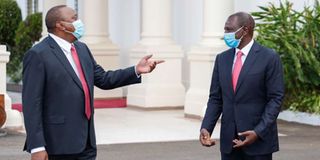Class war recipe for anarchy

President Uhuru Kenyatta has a word with his deputy Dr William Ruto during the 57th Madaraka Day Celebrations on June 01, 2020 at State House Gardens, Nairobi.
What you need to know:
- It would be profoundly dangerous for political leaders to instigate a social class war and sow venomous seeds of discord of perceived oppression and inequality.
- The narrative of the supposed proletariats, codified as ‘“hustlers”, and the alleged bourgeoisie (“dynasties”) can ignite a devastating class warfare.
The aftermath of the 2007 presidential election dispute predisposed the country to near-anarchy, characterised by civil unrest, deaths, social disruption and destruction of property.
The spontaneous violence was fuelled by political incitement with negative ethnicity the potent bait to lure the citizens to rise against one another.
People lost lives, property worth billions looted and destroyed. Thousands were displaced. The economy crumbled, investors pulled out of the country, families were ruined, education was paralysed and everything came to a standstill.
The ideology of inclusivity, therefore, seeks to address politics of ethnicity, an ages-old reality in Kenya and, more often than not, politicians use to whip up emotions for political capital.
Having gradually made significant baby strides to this end, it would be profoundly dangerous for political leaders to instigate a social class war and sow venomous seeds of discord of perceived oppression and inequality.
Ensure equity
Disparities in economic endowment is a natural phenomenon and those in the lowest stratum should continuously be empowered through feasible policies to ensure equity, not fanning hatred.
As we head towards an electioneering period, the narrative of the supposed proletariats, codified as ‘“hustlers”, and the alleged bourgeoisie (“dynasties”) can ignite a devastating class warfare.
The small and medium enterprises (SMEs) sector accounts for 80 per cent of all enterprises in the country and employs two thirds of the population. This is the productive youth, who can only be made an asset through gainful employment and not turning them into bitter agents of destruction.
But that cannot be achieved in an environment where investors are not assured of the security and sustainability of their investments. Political stability and safety are key pre-conditions for business.
Mr Munuhe is diplomacy and communication consultant. @kinyurumunuhe





